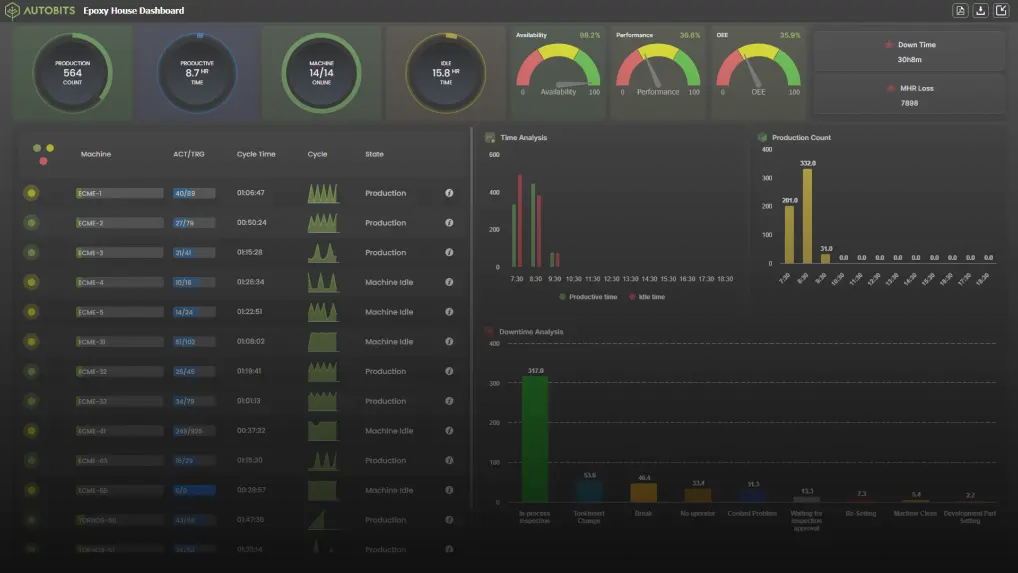Industrial IoT gateways are vital devices that facilitate communication between industrial devices and cloud platforms. IIoT gateways collect data from sensors, process that data, and transmit the data to cloud-based systems while ensuring data protection. Industrial IoT gateways provide a smooth flow of data while maintaining connectivity and security for industrial automation systems.
Types of IIoT Gateways
Fanless IoT Gateways
Designed with a fanless format to suit dusty or high temperature ambient conditions while operating in passive cooling, they are ideal for optimal performance, reliability, safety and durability.
Rugged IoT Gateways
Built for extreme environments, the rugged IoT gateways are optimized for extreme conditions such as high temperature, vibration, and humidity. They are best suited for Outdoor and industrial applications where strong performance is needed.
The Growing Need for IIoT Gateways
With the increase of smart automation and cloud-based technologies in industries, the demand for Industrial IoT gateways has grown. Companies are using Industrial IoT gateways to improve production efficiency, enable remote monitoring, and reduce downtime.

What are the Main Functions of Industrial IoT Gateways?
- Improved Efficiency in Production: Industrial IoT gateways enhance production efficiency by seamlessly collecting and transferring data in real-time, reducing errors, and increasing productivity.
- Strong Communication and Control with Modular I/O: These gateways have multiple input/output (I/O) interfaces so machines, sensors, and cloud platforms can communicate with each other.
- Real-Time Data Analytics and Decision-Making: Industrial IoT gateways will automate data processing capabilities to enable decision-making using real-time information, minimizing delays in industrial environments.
- Facilitate Predictive Maintenance in Manufacturing: Industrial IoT gateways may assist to predict failure in manufacturing equipment by leveraging historical and real-time sensor data, thereby optimizing maintenance expenses and unplanned maintenance intervals.
Benefits of IIoT Gateways
Industrial IoT (IIoT) gateways are key to transforming manufacturing and industrial activities. They provide valuable benefits, including improved communications, increased efficiency, and security. Here are a few highlights on the benefits:
Seamless Data
Industrial IoT gateways act as a bridge between legacy manufacturing equipment and newer cloud-based alternatives, enabling smooth integration between the two. This strategy provides businesses with the ability to make data-based decisions in real-time.
Improved Security
IIoT gateways provide encryption, firewall protection, and secure authentication capabilities to secure critical data from various cyber threats. They provide the first line of defense against unauthorized access attempts as well as hacking attempts.
Operational Efficiency
IIoT gateways collect, process, and transmit data quickly and efficiently, helping to reduce downtime, improve workflow efficiency, and enhance operational efficiency overall.
Predictive Maintenance
Industrial Internet of Things gateways gather sensor data that can identify potential disturbances in equipment performance and alert businesses to perform maintenance prior to equipment failure, which reduces the likelihood of unforeseen failures and downtime as well as repair costs.
Real-time Monitoring and Control
Businesses can remotely monitor their industrial processes and operations as well as their assets in real-time, which allows them to quickly address potential issues to minimize business interruptions and enhance productivity.
Scalability and Flexibility
IIoT gateways can process and support various communication protocols and cloud-based systems. This compatibility allows them to be tailored to specific and varying industrial needs, while providing additional scalability by allowing for increased support as an enterprise grows.
Cost Savings
With improved efficiency and predictive maintenance, businesses can limit costs associated with operations. Industrial IoT gateways create cost reductions through better energy use, enhanced production optimization, and minimizing resource waste.
Key Considerations for Choosing an Industrial IoT (IIoT) Gateway
Selecting the right IIoT gateway is crucial for ensuring seamless industrial automation. Here are the key factors to consider when choosing an Industrial IoT gateway:
- Identify Your Company’s Ultimate Objective: What do you want to accomplish with Industrial IoT integration? Will you be using the gateway for real-time monitoring, predictive maintenance, or process automation? Understanding your objectives will help you select a gateway that will meet your company goals.
- Security Features: Industrial IoT gateways will be used to manage critical industrial data. You will want security features such as encryption, firewalls, and multi-layer authentication designed to avoid cyber threats.
- Storage Capabilities: The gateway should have adequate storage capabilities to effectively manage and handle large forms of industrial data. Consider both onboard storage, and storage capabilities with cloud integration.
- Ruggedness and Durability: Industrial settings can be harsh environments with exposure to dust, water, and temperature fluctuations. Make sure the Industrial IoT gateway is rugged to withstand these conditions or are meant for the industrial environment.
- Installation Environment: Determine whether the IIoT gateway will be at an indoor installation site or outdoor installation site. It should have the right enclosure rating, such as IP67, if it is going to be an outdoor installation, and can handle external environmental hazards.
- Device Support: You will want to verify that the Industrial IoT gateway will have support for numerous, various communication protocols, such as MQTT, Modbus, OPC UA, and BACnet, with connecting different industrial equipment.
- Edge Computing Features: There are gateways that will allow the processing of data at the edge before sending information to the cloud. This can improve response time and aid in making timely users decisions.
- Connectivity Options: Look at which connectivity options are available on the gateway, like Wi-Fi, Ethernet, LTE, or 5G. Connectivity options are key to easily moving data across the industrial enterprise.
- Power Usage: Being able to use less power is important, especially in very remote locations within the industrial enterprise. Find gateways with power support to lessen energy costs.
- Equipment Compatibility: Be sure that your gateway choices will work with existing industrial devices and machines to limit compatibility issues later on, and avoid a lot of cost.
- Future Proofing: Choose, if possible, a gateway that is able to focus on supporting future technology and not just the technology you may be looking for.
- Ease of Integration: A credible IIoT gateway should integrate without huge adjustments or changes to existing industrial software and platforms.
- Customization: Some IIoT gateways will allow businesses customization away from out of the box specs to fit your industry needs and technology based on performance improvements.
By carefully evaluating these factors, businesses can choose the right Industrial IoT gateway that enhances industrial efficiency, security, and scalability.
Industrial IoT Gateway Devices
Multiple manufacturers are offering high-quality IIoT gateways, including Autobits Labs, Advantech, Siemens, Moxa, and Dell. These brands provide a variety of options suited for different industrial needs.
Get Top-Notch Industrial IIoT Solutions!
Choosing the right Industrial IoT gateway can revolutionize industrial operations by enabling more sustainable, efficient, secure, and data-driven operations. Consider your needs and factors and access the best solution for you and your organization’s goals.
Over to You
The right IIoT gateway can unlock new levels of efficiency in industrial operations. Whether you need real-time monitoring, predictive maintenance, or seamless communication, choosing the right gateway ensures long-term success.
FAQs About Industrial IoT gateway
What is the primary role of IIoT gateways?
An IIoT gateway connects industrial devices to the cloud, allowing for data collection and processing, and a means of secure communication.
How do IIoT gateways enhance security in industrial environments?
Industrial IoT gateways utilize firewalls, encryption, and secure authentication methods to protect sensitive data from cyber threats.
What are the differences between fanless IoT and rugged IoT gateways?
Fanless IoT gateways utilize passive cooling and are used in indoor locations, while rugged IoT gateways operate in harsh industrial environments and are tolerant of extreme temperatures and vibrations.
Can Industrial IoT gateways communicate directly with multiple protocols?
Yes, many Industrial IoT gateways can directly communicate with a variety of protocols such as MQTT, Modbus, OPC UA and Ethernet/IP, enabling device integration.
What are the primary industries that benefit from Industrial IoT?
Manufacturing, oil and gas, transportation, smart cities, and, to a lesser degree, health care are the primary industries that benefit from Industrial IoT gateway solutions.





